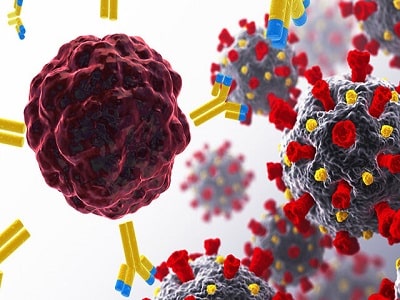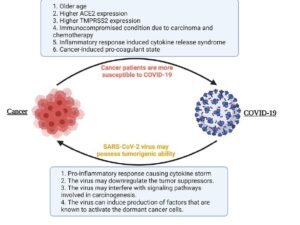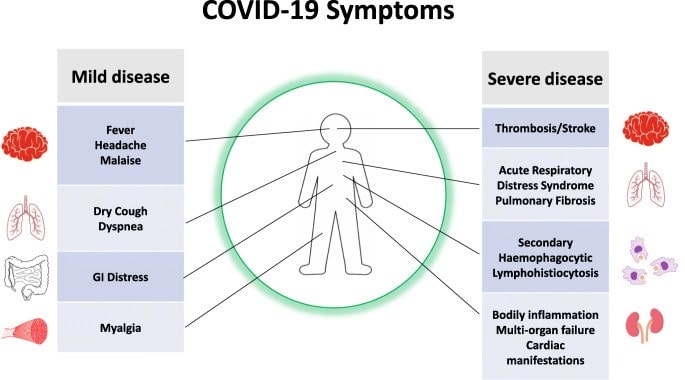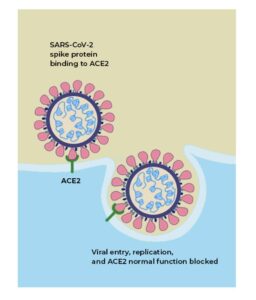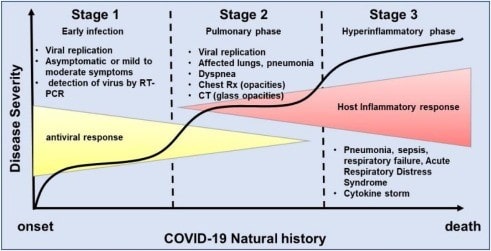What is the connection between CoVID-19 and cancer?
The relationship between cancer and CoVID-19
Respiratory infection caused by the coronavirus (SARS-CoV-2), which has been long known as a global pandemic, puts people at risk for underlying diseases, including cancer. Due to the importance of being, aware of the molecular processes involved as well as finding effective drug therapies for cancer patients against this virus, Numerous studies have been performed on the association between CoVID-19 and cancer. these researches have been done to answer the questions such as why the onset of CoVID-19 symptoms in cancer patients, the cancer patient’s immune response to CoVID-19, and the potential for the carcinogenicity of the virus in humans. In the following, we will examine these cases.
Coronavirus (SARS-COV-2)
Since late 2019, humans have been plagued by the Coronavirus pandemic as a global health crisis. According to the World Health Organization, on June 14, 2021, the number of confirmed cases of CoVID -19 worldwide exceeded 175 million and the global death toll was over 3.7 million.
The SARS-CoV-2 virus has a single-stranded RNA and the corona virion is spherical in shape with crown-like protrusions on the surface. The virus is often transmitted through direct contact with the patient’s respiratory droplets, and its incubation period is about 4-5 days.
SARS-CoV-2 virus infection (CoVID-19) is mainly associated with fever, dry cough, fatigue, numbness, and anorexia. Over time, some patients develop shortness of breath, joint pain, diarrhea, or headache.
In CoVID-19, a chest CT scan in acute conditions of the disease shows symptoms of pneumonia along with other complications such as acute heart disease, acute respiratory distress syndrome (ARDS), and secondary infections. The airways of a CoVID-19 patient are damaged to such an extent that they trigger aggressive inflammatory reactions in the body. The immune system then increases the production of cytokines (creating a cytokine storm) and sepsis.
This inflammatory reaction causes serious damage to the organs and causes insufficiency in the organs of the body. The severity of the disease increases with age and the history of diseases such as cancer. According to clinical studies, cancer patients are highly susceptible to the severe form of this viral disease.
Is cancer related to the severity of the disease and the death of CoVID-19?
Cancer patients are reported to be highly susceptible to severe symptoms of CoVID-19 disorders. In the following, we will explain some clinical studies that show the association between the severity of Covid-19 symptoms and cancer.
1) Recently, a study was conducted on 536 patients with CoVID-19 without a history of cancer and 105 patients with CoVID-19 and cancer. The participants in this study were the same age. Based on the findings of this study, cancer patients show all the severe symptoms of CoVID-19. These symptoms are mainly seen in patients suffering from leukemia, lung, and high-grade cancers. In addition, patients with metastatic cancer with COVID-19 had a higher risk of death.
2) Desai et al. showed that 2% of CoVID-19 patients also have cancer. In addition, cancer patients who have undergone surgery or chemotherapy are at a higher risk (75% higher) than others for the severe complications of the disease.
3) In a study conducted by Zhang et al. On 28 patients with CoVID-19 and cancer; fifteen people developed severe CoVID-19 disorders and eight died. The most common types of cancer in this study were lung, esophageal, and breast cancers. In addition, cancer patients who underwent chemotherapy 14 days prior to diagnosis of COVID-19 showed more severe clinical symptoms than others did.
4) Mehta et al. conducted another study on 218 patients with Covid-19 and cancer. Mortality rates were high in patients with lung cancer (55%), upper gastrointestinal cancer (38%), pancreas (67%), and colon (38%), and female genital cancers (38%).
This series of studies (click here to read all the research done in this regard) shows that these patients are more likely to develop CoVID-19 and prove that they have more severe clinical symptoms.
CoVID-19 and Cancer: What factors link the two diseases?
To find the molecular link between the two diseases and the cause of the increased severity of CoVID-19 symptoms in most cancer patients, we first examine the function of the virus in the body and how its genetic material enters the cell.
The SARS-CoV-2 virus binds to the angiotensin-converting enzyme (ACE2) receptor on the surface of host cells to enter cells and proliferate. ACE2 receptors are present in many tissues, including the cornea, nose, lungs, esophagus, heart, stomach, liver, ileum, colon, gallbladder, kidney, and testis.
The virus binds to the ACE2 receptor using surface proteins and host proteases such as TMPRSS2, cathepsin L, and furin. In fact, these proteases help to bind the virus to the cell membrane and release viral RNA to the host cell cytosol by creating a gap in the S proteins (virus surface proteins).
Importance of ACE2 receptor in pathogenicity of CoVID-19 and its association with cancer
ACE2, which regulates many activities of the enzyme angiotensin II; is a vital part of a biochemical pathway needed to regulate processes such as blood pressure, wound healing, and inflammation. Angiotensin II (ANG II), which is most associated with CoVID-19, can increase inflammation and cell death in the air sacs. These harmful effects of ANG II are reduced by ACE2. The results of the latest research in this regard are:
Recently, the importance of ACE2 receptors in viral pathogenesis has been investigated by infecting transgenic mice carrying human ACE2 receptors. Mice infected with ACE2 experienced symptoms such as weight loss and virus replication in the lungs, along with pneumonia and the accumulation of macrophages in the alveolar cavities. Bronchial and alveolar epithelial cells as well as macrophages showed the presence of viral antigens. On the other hand, wild-type mice did not develop viral infections.
Another study showed an increase in ACE2 expression in the lungs with age. Older people over the age of 60 or who have weakened immune systems are more likely to get CoVID-19. Therefore, because cancer is more common in the elderly and ACE2 expression increases with age, cancer patients are more likely to experience severe symptoms due to coronavirus infection.
According to another study, ACE2 expression is increased in the lungs of smokers and people suffering from smoking-related lung diseases (including lung cancer). Hence, smokers and patients with lung cancer are more likely to develop severe CoVID-19.
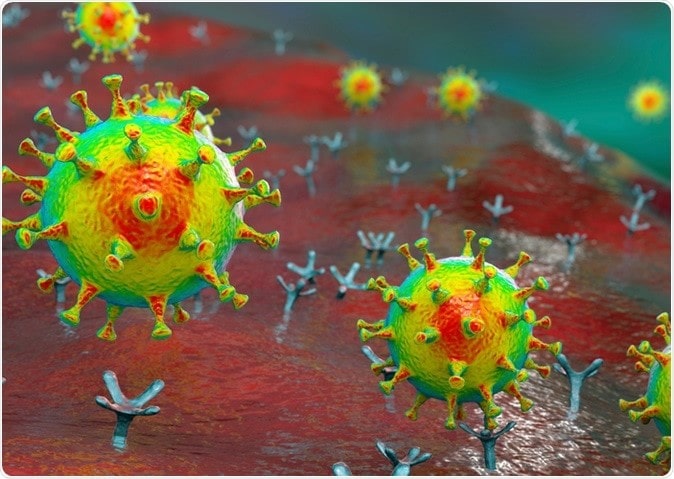
Immune response to coronavirus infection in people with cancer
Patients with various types of cancer or those who have been treated for various diseases have a weaker immune system than healthy people have and are more likely to develop CoVID-19 and its complications. According to research, several cases can be linked to the immune response to Covid-19 and cancer.
- Macrophages play an important role in the inflammatory responses associated with CoVID-19 and cancer. M1 macrophages are activated by coronavirus infection. This type of macrophage is associated with macrophage activating syndrome (MAS), cytokine storm, lymphopenia, endothelial damage, and increased intravascular blood coagulation. On the other hand, M2 macrophages are activated in cancer patients, suppressing the immune response and helping tumor progression. Ultimately, this suppression of the immune system by macrophages M2 disrupts the antiviral immune response, predisposing cancer patients to viral infections.
- Some inflammatory and coagulation processes in CoVID-19 and cancer overlap or overlap. This increases the inflammatory reactions of cancer patients to Corona infection, as well as the possibility of blood clotting and coagulation, and eventually the development of severe CoVID-19.
Does CoVID-19 increase the risk of cancer?
The coronavirus, like all oncoviruses, triggers inflammatory reactions. In Covid-19 patients, the level of proinflammatory cytokines is greatly increased, leading to a cytokine storm.
We also know that the Nsp15 coronavirus endoribonuclease enzyme disrupts the function of retinoblastoma (a tumor suppressor protein). Therefore, conclusive evidence is not available to answer this question. However, the inflammatory reactions of the virus and the pathogenic interference of the SARS-COV-1 virus (a virus in the coronavirus family that causes SARS) with the major pathways involved in cell growth and tumorigenesis may necessitate further investigation.
Research on the link between CoVID-19 disease and cancer and trying to find a solution to treat CoVID-19 cancer patients is of great importance. Raising awareness of how receptors, enzymes, and immune cells work to fight CoVID-19 and cancer and find a way to prevent or reduce the symptoms of this complication will be effective in cancer patients.
References:
- https://link.springer.com/article/10.1007/s12032-021-01553-3#Sec3
- https://www.news-medical.net/health/What-is-TMPRSS2.aspx
- https://theconversation.com/what-is-the-ace2-receptor-how-is-it-connected-to-coronavirus-and-why-might-it-be-key-to-treating-covid-19-the-experts-explain-136928
- https://www.sciencedirect.com/science/article/pii/S0753332220306867


